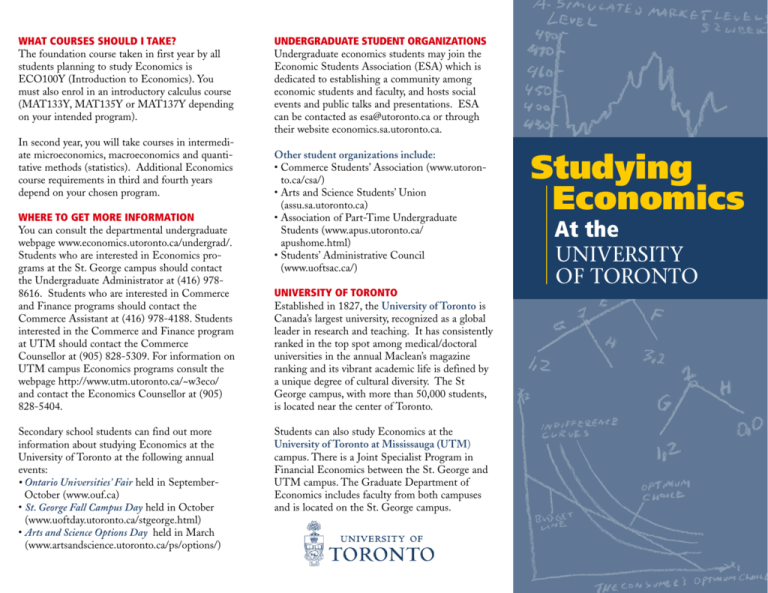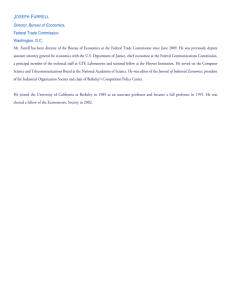Studying Economics - Department of Economics
advertisement

WHAT COURSES SHOULD I TAKE? The foundation course taken in first year by all students planning to study Economics is ECO100Y (Introduction to Economics). You must also enrol in an introductory calculus course (MAT133Y, MAT135Y or MAT137Y depending on your intended program). In second year, you will take courses in intermediate microeconomics, macroeconomics and quantitative methods (statistics). Additional Economics course requirements in third and fourth years depend on your chosen program. WHERE TO GET MORE INFORMATION You can consult the departmental undergraduate webpage www.economics.utoronto.ca/undergrad/. Students who are interested in Economics programs at the St. George campus should contact the Undergraduate Administrator at (416) 9788616. Students who are interested in Commerce and Finance programs should contact the Commerce Assistant at (416) 978-4188. Students interested in the Commerce and Finance program at UTM should contact the Commerce Counsellor at (905) 828-5309. For information on UTM campus Economics programs consult the webpage http://www.utm.utoronto.ca/~w3eco/ and contact the Economics Counsellor at (905) 828-5404. Secondary school students can find out more information about studying Economics at the University of Toronto at the following annual events: • Ontario Universities’ Fair held in SeptemberOctober (www.ouf.ca) • St. George Fall Campus Day held in October (www.uoftday.utoronto.ca/stgeorge.html) • Arts and Science Options Day held in March (www.artsandscience.utoronto.ca/ps/options/) UNDERGRADUATE STUDENT ORGANIZATIONS Undergraduate economics students may join the Economic Students Association (ESA) which is dedicated to establishing a community among economic students and faculty, and hosts social events and public talks and presentations. ESA can be contacted as esa@utoronto.ca or through their website economics.sa.utoronto.ca. Other student organizations include: • Commerce Students’ Association (www.utoronto.ca/csa/) • Arts and Science Students’ Union (assu.sa.utoronto.ca) • Association of Part-Time Undergraduate Students (www.apus.utoronto.ca/ apushome.html) • Students’ Administrative Council (www.uoftsac.ca/) UNIVERSITY OF TORONTO Established in 1827, the University of Toronto is Canada’s largest university, recognized as a global leader in research and teaching. It has consistently ranked in the top spot among medical/doctoral universities in the annual Maclean’s magazine ranking and its vibrant academic life is defined by a unique degree of cultural diversity. The St George campus, with more than 50,000 students, is located near the center of Toronto. Students can also study Economics at the University of Toronto at Mississauga (UTM) campus. There is a Joint Specialist Program in Financial Economics between the St. George and UTM campus. The Graduate Department of Economics includes faculty from both campuses and is located on the St. George campus. Studying Economics At the UNIVERSITY OF TORONTO ECONOMICS examines the conflict between human demands for goods and services and the limited supply of resources available to produce those goods and services. The field is traditionally divided into three broad areas: Microeconomics studies how individuals, households and firms make decisions and how they interact in specific markets; Macroeconomics studies how markets interact to determine economy-wide phenomena and how economies interact to determine global outcomes; and Econometrics develops and applies statistical techniques for estimating economic models and testing economic theories. Undergraduate training in economics familiarizes students with the discipline and equips them for the intelligent appraisal of contemporary economic problems. It also makes students aware of the broad spectrum of policy issues to which economic analysis is relevant. Students may choose to study a number of different areas within economics including (but not limited to): international trade and finance; developed vs. less-developed economies and problems of economic growth; employment and compensation; market structure and competitive strategy among firms; financial economics, corporate finance and risk management; monetary theory and policy; economic history of Canada, the U.S, Europe and Asia; urban economics; forecasting; economics and demographic change; health economics; environmental economics; taxation, government expenditures and the political economy of domestic and international economic policy making. The Department of Economics at the University of Toronto ranks among the top economics departments in Canada and elsewhere. We have more than forty full-time faculty members at the St. George campus, close to twenty at the UTM campus, and others who are cross-appointed to Faculties of Management and Law. Faculty members offer courses and conduct research in a wide range of fields within economics. Opportunities are available for interested students to participate in some of their research projects. ECONOMICS PROGRAMS In the Faculty of Arts and Science, you do not enroll in a program of study until the end of your first year or after you complete four credits. The programs offered by the Department of Economics can lead to a Bachelor of Arts (B.A.), Bachelor of Science (B.Sc) or a Bachelor of Commerce (B. Com) after completing 20 full year credits and either one specialist program, two major programs or one major and two minor programs. Students can choose from the following programs: • Minor in Economics, Economic History, Environmental Economics • Major in Commerce, Economics, Economic History • Specialist in Economics, Economics (Quantitative Methods), Economics (Commerce and Finance), Financial Economics, Economic History & Economics • Joint specialist in Economics & Computer Science, Economics & Geography, Economics & Mathematics, Economics & Philosophy, Economics & Political Science, Economics & Sociology, Economics & Statistics. WHAT CAN I DO WITH A DEGREE IN ECONOMICS? All economics programs offer solid training for a variety of career opportunities. The specialist programs prepare students for employment in business or government, or for graduate studies in economics, business and law. Occupations pursued by some of our former undergraduate students include investment banking, financial analysis, economic forecasting, management and public policy. Graduates of the specialist program in Commerce (jointly offered by the Department of Economics and the Rotman School of Management) are well prepared for MBA programs and Law schools, as well as for graduate studies in Accounting, Economics, Marketing and Finance. Graduates also pursue professional careers as economists, accountants, actuaries, marketing analysts, managers in the private and public sectors, and proprietors of small businesses. Either of the major programs in Economics and in Economic History can be combined with a major in another discipline (such as computer science, political science, geography, philosophy, sociology) to provide a strong economics background for students interested in careers in these areas. WHAT HIGH SCHOOL PREPARATION DO I REQUIRE FOR ECONOMICS? Information on admission to undergraduate programs in the Faculty of Arts and Science can be obtained from the office of Admissions and Awards, 315 Bloor Street West, Toronto ON M5S 1A3 (www.adm.utoronto.ca). See (www.utm.utoronto.ca) for information on the University of Toronto at Mississauga (UTM). Students who want to pursue a major or a specialist program in Economics should apply to the Social Sciences stream or to the Humanities stream on the St. George campus. Students wishing to study Accounting, Management, Finance and/or Marketing, in addition to Economics, should apply to the Commerce stream. For students completing the Ontario Secondary School Diploma, six Grade 12 U or M credits are required, including Eng4U, MCB4U (Advanced Functions and Introductory Calculus) and one other grade 12 mathematics credit. Students from outside Ontario and students transferring from other postsecondary institutions should contact Admissions and Awards for details on admission requirements.





